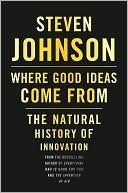More on this book
Community
Kindle Notes & Highlights
that noise makes the rest of us smarter, more innovative, precisely because we’re forced to rethink our biases, to contemplate an alternate model in
Innovative environments thrive on useful mistakes,
taking old parts and putting them to new uses.
Concepts from one domain migrate to another as a kind of structuring metaphor, thereby unlocking some secret door that had long been hidden from view.
clustering creates a positive feedback loop,
environments that are ripe for exaptation, because they cultivate specialized skills and interests, and they create a liquid network where information can leak out of those subcultures, and influence their neighbors in surprising ways.
groups united by shared values and long-term familiarity, conformity and convention tended to dampen any potential creative sparks.
“Once key ideas from idea-spaces that otherwise had little contact with one another were connected, they began, quasi-autonomously, to make new sense in terms of one another, leading to the emergence of a whole that was more than the sum of its parts.”
one project takes center stage for a series of hours or days, yet the other projects linger in the margins of consciousness throughout. That cognitive overlap is what makes this mode so innovative.
Chance favors the connected mind.
an environment that encouraged people to think broadly and generally about task problems, and one in which inquisitive kids felt free to follow their curiosity. Equally important, it was an environment wherein kids, with an initial success, could turn to colleagues who were broadly expert in relevant fields,
they made people think differently, because they created an environment where different kinds of thoughts could productively collide and recombine.
set of rules and conventions that govern the definition of terms, the collection of data, and the boundaries of inquiry for a particular field.
On an open platform, good ideas can come from anywhere.
long tradition exists of citizens committing time and intellectual energy to tackling problems where there is a perceived civic good at stake.
innovation thrives in discarded spaces.
the inventive collaborations of density.
when you don’t have to ask for permission, innovation thrives.
It is in the nature of good ideas to stand on the shoulders of the giants who came before them,
non-market individuals.
This is the pattern that forms when information networks are slow and unreliable,
the era is dominated by solo artists: amateur investigators, usually well-to-do, working on their own private obsessions.
majority of breakthrough ideas emerge in collaborative environments.
open environments where ideas flow in unregulated channels.
When you introduce financial rewards into a system, barricades and secrecy emerge, making it harder for the open patterns of innovation to work their magic.
new ideas are published with the deliberate goal of allowing other participants to refine and build upon them, with no restrictions on their circulation beyond proper acknowledgment of their origin.
theory itself can freely circulate through the environment, where it can be challenged, enlarged, exapted, and recycled in countless ways.
in the grad seminar and the coffeehouse and the hobbyist’s home lab and the digital bulletin board.
the collaborative and connective forces at work in the natural world.
That ideas should freely spread from one to another over the globe, for the moral and mutual instruction of man, and improvement of his condition, seems to have been peculiarly and benevolently designed by nature,
fundamentally alter the way they cultivate and promote good ideas.
unlocked so many doors of the adjacent possible because of the way it shares.
Ideas rise in crowds,
Go for a walk; cultivate hunches; write everything down, but keep your folders messy; embrace serendipity; make generative mistakes; take on multiple
hobbies; frequent coffeehouses and other liquid networks; follow the links; let others build on your ideas; borrow, recycle, reinvent. Build a tangled bank.


